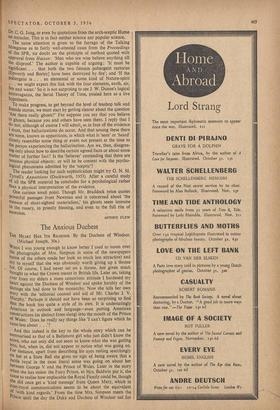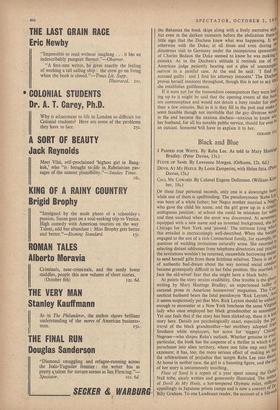The Anxious Duchess
THE HEART HAS ITS REASONS. By the Duchess of Windsor. (Michael Joseph, 30s.) WHEN I was young enough to know better I used to moon over the photographs of Mrs. Simpson in some of the newspapers (some of the others made her look so much less attractive) and say to myself that she was obviously worth giving up a throne for. Of course, I had never sat on a throne, nor given much thought to what the Crown meant in British life. Later on, taking over from my elders a more censorious attitude I hardened my heart against the Duchess of Windsor and spoke harshly of the damage she had done to the monarchy. Now she tells her own story with the 'editorial counsel and aid of Mr. Charles J. V. Murphy.' Perhaps it should not have been so surprising to find that the book has quite a style of its own. It is undeviatingly American in outlook and language—even putting American Constructions (as distinct from slang) into the mouth of the Prince of Wales: Does he really say things like 'I can't figure which he cares less about . . .'?
And this indeed is the key to the whole story which can be summarised as that of a Baltimore girl who just didn't know the core, who not only did not seem to know what she was getting into, but, when in, did not appear to notice what was going on. For instance, apart from describing his eyes resting searchingly on her at a State Ball she gives no sign of being aware that a battle royal in the most literal sense was going on about her between George V and the Prince of Wales. Later in the story when she has stolen the Fairy Prince, as Mrs. Baldwin put it, she came to realise how implacable the Royal Family could be, though she did once get a 'kind message' from Queen Mary, which in inter-royal communications seems to be about the equivalent
.Of With kind regards.' From the time Mrs. Simpson meets the Prince until the day the Duke and Duchess of Windsor sail for
the Bahamas the book skips along with a lively narrative stYl!, but even in the darkest moments before the abdication there little sign that the Duchess knew what was happening. It W1 otherwise with the Duke; at all times and even during th,°' disastrous visit to Germany under the inauspicious sponsorsbIP of Charles Bedaux the Duke seemed to know he was making mistake. As to the Duchess's attitude it reminds me of the d American judge patiently hearing out a plea of unexamP1 naiveté in a painful case. At the end he said : '1 find lb6 accused guilty : and I find his attorney innocent.' The Duchesst proves herself innocent throughout, though this is not to say the she establishes guiltlessness. If it were not for the tremendous consequences they were lead: ing up to it might be said that the opening events of the WO arc commonplace and would not detain a busy reader for mere than a few minutes. But as it is they fill in the past and make Id seem feasible though not inevitable that the gay divorcee WAIL in the end become the anxious duchess—anxious to know we' her husband, for all his notable public service, should for ever be an outcast. Someone Will have to explain it to her. GERARD 17AY



















































 Previous page
Previous page